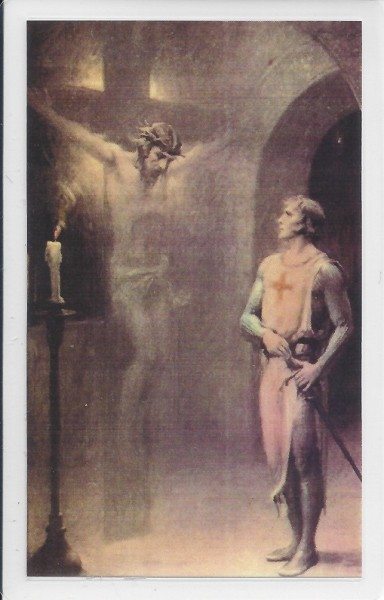Following Christ the Hero: Ardent Love in Steadfast Asceticism
Admiration is a necessary stage in establishing a relationship of love. But it is only the first one: if one remains an admirer without committing one’s existence to the admired hero, one cannot claim to be a follower. One is standing at a distance, and, in the case of the Catholic, one merits the epithet of an “aesthetic Catholic” (George Santayana).
“Two brothers, Clarence and Robert, committed their lives to Jesus in their youth. Clarence grew up and became a civil rights activist. Working for these rights was hard in the 1960s: racial tension was high; people staged sit‑ins; police used dogs and fire hoses to disperse the activists. Robert grew up and became a lawyer. One day Clarence asked Robert for legal help in a civil rights matter. Robert refused, saying it could hurt his political future. When Clarence asked him about his commitment to Jesus, Robert replied, “I do follow Jesus, but I’m not going to get crucified like he was.” Clarence looked hard at his brother, “Robert, you’re not a follower of Jesus -you’re only a fan.” (Mark Link, Challenge, 1993, p. 176.)
Admiration at some stage must become a decision to follow the admired one even in the face of risks, dangers, and sacrifices. This is love. And love ‒ if one fans it into a flame ‒ can become a fire. “Love is a fire no waters avail to quench, no floods to drown; for love, a man will give up all that he has in the world, and think nothing of his loss.” Song of Songs 8: 7. Inigo became “Ignatius” [Man of Fire] because from being an admirer he became a follower because he placed his heart close to the source of supernatural love: the Heart of the Crucified Christ. The ardor of this love was kept burning by his spending the rest of his life standing close to the cross by prayer and asceticism, so close that he could hear the last heart beats of love of the Crucified Christ.
By following the hero on his dangerous journey into the dangers of enemy-occupied territory, there gradually grows a bond between the follower and the hero. The follower becomes the hero’s loyal friend; the close companion who is inseparable from his friend in adventure and ordeal; his co-worker, a close cooperator, one who, even though capable of momentary disloyalty, becomes ever more unyielding in his devotion.
In history and literature such heroes and their loyal followers have always aroused admiration and continue to do so today even if our contemporary society scrutinizes them with the feverishly suspicious eyes of the morally jaded and decadent.
Among outstanding historical exemplars are Moses and Aaron, Elijah and Elisha.In the literary world, we have the characters of Sam and Frodo in The Lord of the Rings where in scenes and language rich with redemptive and priestly nuances, the heroic savior of Middle-Earth, and his loyal and no less heroic companion, set out from Rivendell towards Mount Doom in order to destroy the ring and end the dominion of Sauron.
What both history and literature teach is that in order for a man to pass from being a mere admirer of Jesus Christ to a comrade-in-arms, he must set out on a journey. Any journey implies separation, a leaving behind ‒ one must leave behind the shores of one’s previous existence, enter the boat of Christ, and sail with Him into uncharted waters in order, after many hardships, dangers and adventures, to finally reach the goal of becoming a comrade-in-arms of the Lord Jesus.
This following implies immersing oneself in the dynamism of gradual change through channeling the forces of one’s intelligence and decision-making to acquire knowledge of Jesus Christ. It implies thinking long, hard and deep about Him in order to pray. It implies allowing the mysterious but ever so real action of His Holy Spirit to inflame the heart with love for the Heroic Christ. This is the age-old pattern visible in the lives of the Christian heroes to whom Christ can say, as he said to his first priests: “You have been with me from the beginning” (Jn 15:27).
But, although the follower’s own free will and constantly renewed decision is necessary for growth in closeness to the Heroic Christ, he does not have to depend on his own fragile forces. Indeed, essential to the growth in depth of his relationship with Christ is the ever keener awareness that his own will power is fragile in the face of the onslaughts of the triple enemy of his soul and that he needs to rely on the light and strength of the Hero. This light and strength is what Catholicism terms “sanctifying and actual grace”. To this we will now turn our attention.

